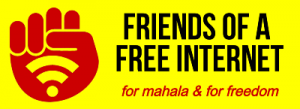Friends of a Free Internet has submitted a response to ICASA’s intention to hold a second spectrum auction calling for spectrum to be used to expand the communication commons. See the substance of our submission below and the full submission online here.
Stop selling the sun to buy a candle. Break the cartel.
Internet access enables the constitutionally guaranteed rights to Free Expression and Access To Information and Freedom of Association. No price can be put on our basic rights – which by definition must be universal.
SA’s regulatory regime has failed to enable access to affordable internet because of an over reliance on the profit motivated private sector. The result has been cherry picking, super profits, and regressive anti-poor pricing structures.
The primary obstacle to reaching universal internet access in South Africa is the cartel of network operators – MTN, Vodacom, Telkom, Cell C – that dominate mobile telecoms services.
The Competition Commission has found that cartel members have abused their positions to maximise profits and deny services to those without the income to pay as well as those who live in areas where the provision of network coverage is not profitable.
ICASA’s regulatory regime has enabled and entrenched the cartel’s hold on the mobile internet. The first spectrum auction was yet another moment in the service of cartel interests
Enable the spectrum commons
We believe the current auction should be seen in the light of the sudden cancellation of the Wholesale Open-Access Network (WOAN) just before the last round of auctioning. The objective of the WOAN was to foster competition in the national telecoms market by lowering the entrance barrier for new participants. It was to do this by recognising that spectrum is a commons to be managed, rather than sold or leased on an exclusive basis.
By obliging cartel members to host Mobile Virtual Network Operators (MVNOs) and by providing for ad hoc and localised spectrum rights, the WOAN had the potential to allow new market entrants including community telecoms networks and, by increasing competition, to lower end-user prices. In the absence of a proper explanation by ICASA for its termination of the WOAN, we can only conclude that this threat to cartel profits was averted by backroom lobbying. The flippant statement by ICASA that in the only case where a WOAN had been tried (in Mexico) it had “failed,” is at best subjective and at worst, deceptive. Mexican community networks report that they are still participating in its structures, despite teething problems (from which ICASA and South African civil society could have learned, in order to avoid or mitigate them).
By ambushing us shortly before the last auction with the announcement that the WOAN had been scrapped, ICASA has presented a fait accompli that while probably indefensible in constitutional law, would require vast expense and disruption to reverse, as some portions of spectrum that were reserved for the WOAN are already in use by cartel members.
In this context, we assert that the minimum acceptable course of action by ICASA in the final auction, is to recuperate some degree of a managed commons in the remaining spectrum lots. Proposals for doing this, drawing on international best practice, are contained in the submissions of progressive organisations such as the Association for Progressive Communication, so we will not repeat the details.








